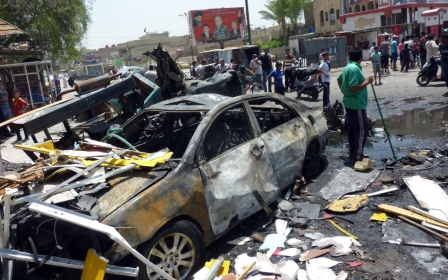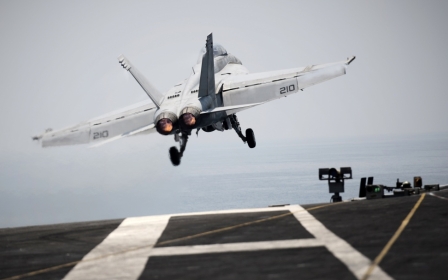A week of bloodshed and violence continues in Iraq

Iraqi officials worked Saturday to ease soaring tensions after 70 people were gunned down at a Sunni mosque, as attacks in Baghdad and areas to its north killed over 30 more.
The attack at the mosque in Diyala province the day before, which most accounts said was the work of Shiite militiamen, threatens to increase anger among Iraq's Sunni Muslim minority with the Shiite-led government at a time when an anti-militant drive depends on their cooperation.
The violence came as the US, which is carrying out air strikes in Iraq against Islamic State (IS) militants, ramped up its rhetoric over the grisly killing of journalist James Foley by the group and shown in a video posted online.
US Deputy National Security Adviser Ben Rhodes said Foley's beheading "represents a terrorist attack against our country". "We’re not going to be restricted by borders. We’ve shown time and again that if there’s a counterterrorism threat, we’ll take direct action against that threat if necessary," Rhodes said in a press briefing.
"All the political entities condemned the crime, all of them expressed their anger about what happened," he said in televised remarks.
"Now we are waiting for practical measures to hold the criminals accountable."
Call to close ranks
Premier-designate Haidar al-Abadi, a Shiite, has condemned the attack and called for "citizens to close ranks to deny the opportunity to the enemies of Iraq who are trying to provoke strife".
Rights group Amnesty International called Friday's attack a "massacre", and said Iraqi authorities "must properly investigate".
Army and police officers said the attack on the Musab bin Omair Mosque in Diyala came after Shiite militiamen were killed in clashes, while other sources said it followed a roadside bombing near one of their patrols.
Doctors and the officers put the toll from the attack, in which worshippers were sprayed with machinegun fire, at 70 dead and 20 wounded.
Two officers earlier blamed IS for the attack, but most accounts pointed to Shiite militiamen.
The interior ministry announced an investigation into the attack, which it said was carried out by two men on a motorbike following a bombing targeting security and volunteer forces in the area.
The government turned to militiamen to bolster its flagging forces during an IS-led offensive that has overrun large areas of five provinces since June, but in doing so has encouraged a resurgence of groups involved in brutal sectarian killings in past years.
Ibrahim Aziz Ali, whose 25-year-old nephew was among those killed Friday, told AFP he saw five vehicles bearing images of Imam Hussein, one of the most revered figures in Shiite Islam, parked at the mosque.
When he and other residents could finally enter, "we found a massacre", Ali said. Iraqi security officials said the attackers had tried to prevent those injured from being carried to the hospital.
No group has yet claimed responsibility for the attack.
More violence
As officials sought to limit the fallout from the mosque attack, more violence killed at least 34 people and wounded more than 150, officials said.
Three car bombs exploded in the northern city of Kirkuk, killing 21 people, while six more died when a suicide bomber detonated an explosives-rigged vehicle at the entrance to the interior ministry's intelligence headquarters in Baghdad.
The bodies of six soldiers killed Saturday, bearing bullet wounds and with hands bound, were left on a road south of the militant-held city of Tikrit, while a roadside bomb hit a vehicle carrying civilian volunteers north, killing one.
The United Nations, meanwhile, warned that the Shiite Turkmen-majority Iraqi town of Amerli is under threat of a "massacre" by jihadists who have besieged it for more than two months.
"The situation of the people in Amerli is desperate and demands immediate action to prevent the possible massacre of its citizens," UN Iraq envoy Nickolay Mladenov said in a statement.
Abadi and Iraq's top Shiite cleric, Grand Ayatollah Ali al-Sistani, both also called for efforts to help Amerli.
The United States launched an air campaign against IS in Iraq on April 8, and has since carried out more than 90 strikes, including one in the area of the Mosul Dam, the country's largest, on Saturday.
America's top military officer has said that anti-IS operations in Syria may also be needed.
Foley's killing has stoked Western fears that territory seized by the militants in Syria and Iraq could become a launchpad for a new round of global terror attacks.
The 40-year-old freelance journalist was kidnapped in northern Syria in November 2012.
In the execution video, released online, a black-clad militant said Foley was killed to avenge US air strikes against IS.
The man, speaking with a clear south London accent, paraded a second American reporter, Steven Sotloff, in front of the camera and said he too would die if Washington kept up its attacks.
Iran FM visits Iraqi neighbour at war with IS
Iranian Foreign Minister Mohammad Javad Zarif on Sunday began a two-day visit to Iraq, which is fighting a Sunni Muslim insurgency led by Islamic State jihadists, state news agency IRNA reported.
It said he was to meet his Iraqi counterpart Hoshyar Zebari as well as the prime minister-designate, Haidar al-Abadi, with the issue of the Iran-Iraq border demarcation also on the agenda.
Iran, which like Iraq is predominantly Shiite, was a longtime backer of the outgoing premier, Nuri al-Maliki, before dropping its support of the divisive leader in favour of Abadi.
Tehran has called for Iraqi parties to unite in the face of the Islamic State which has seized large swathes of the country and says it is providing advice to Iraqi Kurds fighting the jihadists.
France, meanwhile, has pressed "all countries in the region" including Iran to join Western nations in the fight against the IS, which is also rampaging through Syria.
Stay informed with MEE's newsletters
Sign up to get the latest alerts, insights and analysis, starting with Turkey Unpacked
Middle East Eye delivers independent and unrivalled coverage and analysis of the Middle East, North Africa and beyond. To learn more about republishing this content and the associated fees, please fill out this form. More about MEE can be found here.




